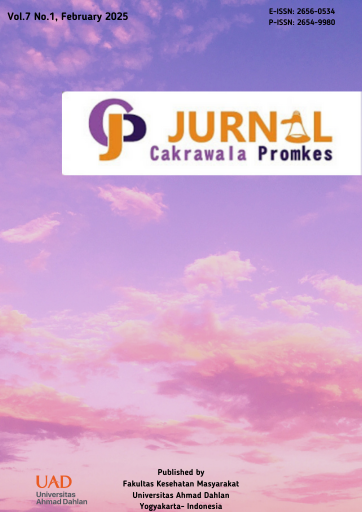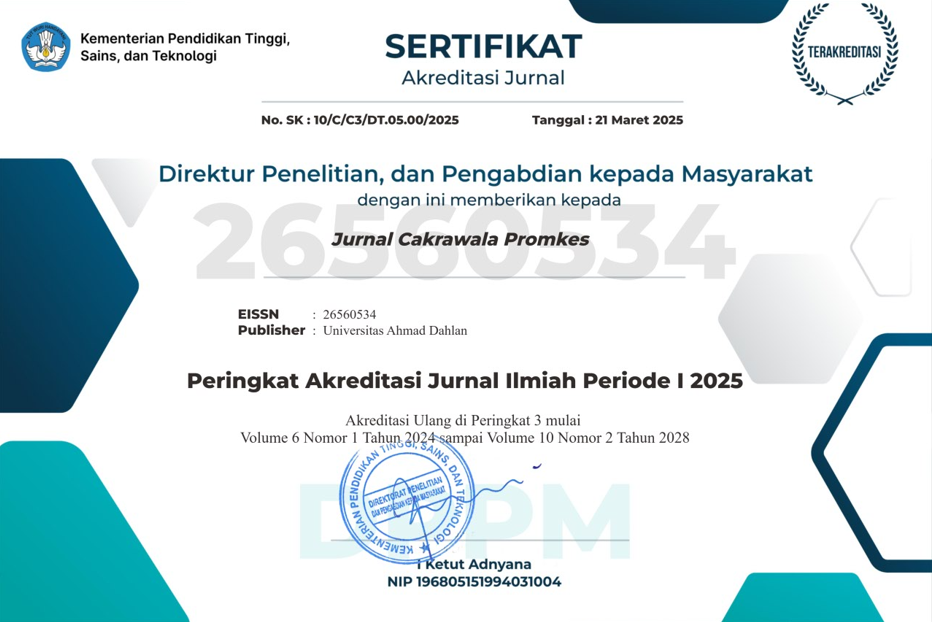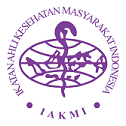The relationship between stress levels and the habits of consuming high-sugar food among undergraduate students
DOI:
https://doi.org/10.12928/jcp.v7i1.11544Keywords:
High-Sugar Food, Stress, University StudentsAbstract
The SKI 2023 survey revealed that 81% of students consume foods high in sugar, while a preliminary study found that severe academic stress increases by 34.2% among students aged 21 to 25. High-sugar food consumption is believed to help reduce stress temporarily. This study aims to investigate the relationship between stress levels and the consumption of high-sugar foods among students at Universitas 'Aisyiyah Yogyakarta (UNISA). This analytical observational research employed a cross-sectional design. The sample consisted of 168 students aged 18 to 25 who were selected using purposive sampling. Data were obtained through the UNISA-UiTM (Universitas 'Aisyiyah Yogyakarta and Universitas Teknologi MARA) 2023 Mental Health research. Respondent characteristics were collected using a structured questionnaire, high-sugar food consumption habits were assessed using the Q-FFQ, and stress levels were measured with the DASS questionnaire. Data collection was conducted both online and offline. Spearman rank correlation analysis was performed, with a significance threshold of p < 0.05. The findings revealed that 39.2% of students experienced stress, while 52.98% had a habit of consuming high-sugar foods. However, the analysis showed no statistically significant relationship between stress levels and high-sugar food consumption (p = 0.11). While no direct correlation was established, high-sugar food consumption remains a concern due to its potential health impacts. Students are encouraged to adopt healthier dietary habits by monitoring their sugar intake, reading nutritional labels, and limiting high-sugar foods to 1–3 times per week. Promoting awareness of balanced diets and stress management techniques may help improve students' mental and physical well-being.
References
Cahyono H. The Role of Students in Society. ADLFI Archéologie la Fr - Informations. 2019;1:32–43.
Sholichah IF, Paulana AN, Fitriya P, . Self-esteem and academic resilience of students. Proceeding Natl Conf Psikol UMG [Internet]. 2018;1:191–7. Available from: http://journal.umg.ac.id/index.php/proceeding/article/view/920
El Ansari W, Berg-Beckhoff G. Nutritional correlates of perceived stress among university students in Egypt. Int J Environ Res Public Health. 2015;12:14164–76. https://doi.org/10.3390/ijerph121114164
Debeuf T, Verbeken S, Van Beveren ML, Michels N, Braet C. Stress and eating behavior: A daily diary study in youngsters. Front Psychol. 2018;9:1–13. https://doi.org/10.3389/fpsyg.2018.02657
Cheng SH, Wong SE. Stress, Emotional Eating and Food Choices Among University Students During the Covid-19. Malaysian J Soc Sci Humanit. 2021;6:335–46. https://doi.org/10.47405/mjssh.v6i9.983
Office of disease prevention and health promotion. Cut Down on Added Sugars. Diet Guide Am. 2015;1–2.
Ra JS. Consumption of sugar-sweetened beverages and fast foods deteriorates adolescents' mental health. Front Nutr. 2022;9. https://doi.org/10.3389/fnut.2022.1058190
USDA. Food Data Central [Internet]. US Dept. Agric. 2023 [cited 2023 Jul 19]. Available from: https://fdc.nal.usda.gov/
Walton J, Bell H, Re R, Nugent AP. Current perspectives on global sugar consumption: Definitions, recommendations, population intakes, challenges and future directions. Nutr Res Rev. 2021; https://doi.org/10.1017/S095442242100024X
Ministry of Health of the Republic of Indonesia. Indonesian Health Survey (SKI). Ministry. of Health. of the Republic of Indonesia. 2023.
Sitorus CE, Mayulu N, Wantania J. The Relationship between Consumption of Fast Food, Sweet Food/Drinks and Physical Activity with Blood Sugar Levels and Nutritional Status of Students of the Faculty of Medicine, Sam Ratulangi University. J Public Heal Community Med. 2020;1:10–7. https://doi.org/10.35801/ijphcm.1.4.2020.31025
Faruque S, Tong J, Lacmanovic V, Agbonghae C, Minaya DM, Czaja K. The dose makes the poison: Sugar and obesity in the United States – A review. Polish J Food Nutr Sci. 2019;69:219–33. https://doi.org/10.31883/pjfns/110735
Herawati N tri, Alamsyah D, Hernawan AD. The Relationship between Sugar, Fat, Salt Intake, and Physical Activity with Hypertension Incidence at Age 20-44 Years Case Study of Posbindu PTM in Secapah Sengkubang Village, Mempawah Hili Health Center Working Area. J Mhs and Health Researcher. 2020;7:34–43. http://dx.doi.org/10.29406/jjum.v7i1.2152
Rippe JM, Angelopoulos TJ. Relationship between added sugars consumption and chronic disease risk factors: Current understanding. Nutrients. 2016;8. https://doi.org/10.3390/nu8110697
Yang Q, Zhang Z, Gregg EW, Flanders WD, Merritt R, Hu FB. Added sugar intake and cardiovascular diseases mortality among us adults. JAMA Intern Med. 2014;174:516–24. https://doi.org/10.1001/jamainternmed.2013.13563
Frank S, Gonzalez K, Lee-Ang L, Young MC, Tamez M, Mattei J. Diet and sleep physiology: Public health and clinical implications. Front Neurol. 2017;8:1–9. https://doi.org/10.3389/fneur.2017.00393
Vigil P, Meléndez J, Petkovic G, Del Río JP. The importance of estradiol for body weight regulation in women. Front Endocrinol (Lausanne). 2022;13:1–16. https://doi.org/10.3389/fendo.2022.951186
Gorczyca AM, Sjaarda LA, Mitchell EM. Changes in macronutrient, micronutrient, and food group intakes throughout the menstrual cycle in healthy, premenopausal women. HHS Public Access. 2016;55:1181–8. https://doi.org/10.1007/s00394-015-0931-0
WHO. Stress [Internet]. World Heal. Organ. 2023 [cited 2023 Apr 18]. Available from: https://www.who.int/news-room/questions-and-answers/item/stress
P2PTM Kemenkes RI. What are the symptoms of stress [Internet]. Kemenkes RI. 2019 [cited 2023 Apr 24]. Available from: https://p2ptm.kemkes.go.id/infographic-p2ptm/stress/apa-saja-gejala-stres
Mofatteh M. Risk factors associated with stress, anxiety, and depression among university undergraduate students. AIMS Public Heal. 2020;8:36–65. https://doi.org/10.3934/publichealth.2021004
Azis MZ, Bellinawati N. Risk Factors of Stress and Their Differences in Students of Various Batches at the Faculty of Medicine, Muhammadiyah University of Palembang. J Kedokt dan Kesehat [Internet]. 2015;2:197–202. Available from: https://ejournal.unsri.ac.id/index.php/jkk/article/download/2556/1401 https://doi.org/10.32539/jkk.v2i2.29
Subramaniam V. Relationship Between Stress and High Blood Pressure in College Students. Medical Science Digest. 2015;2:4–7. https://doi.org/10.15562/ism.v2i1.74
Suwartika I, Nurdin A, Ruhmadi E. Analysis of Factors Related to Academic Stress Levels of Regular Students of D III Nursing Study Program, Cirebon, Poltekkes Kemenkes Tasikmalaya. 2014;9:173–89. https://doi.org/10.20884/1.jks.2014.9.3.612
Muniandy ND, Syed Azhar SN, Aulia Dewi AD, Ibrahim DN. Dietary Behavior and Mental Health Status among Students of Higher Education Institutes in Malaysia. Environ Proc J [Internet]. 2022;7:455–64. Available from: https://doi.org/10.21834/ebpj.v7i20.3394
Adam L, Tomayahu MB. Stress Level With Blood Sugar Level In Diabetes Mellitus Patients. Jambura Heal Sport J. 2019;1:1–5. https://doi.org/10.37311/jhsj.v1i1.2047
Sominsky L, Spencer SJ. Eating behavior and stress: A pathway to obesity. Front Psychol. 2014;5:1–8. https://doi.org/10.3389/fpsyg.2014.00434
Wagner HS, Ahlstrom B, Redden JP, Vickers Z, Mann T. The Myth of Comfort Food. 2014;33:1552–7. https://doi.org/10.1037/hea0000068
Harvard. Why stress causes people to overeat [Internet]. Harvard Heal. Publ. 2021 [cited 2023 Apr 14]. Available from: https://www.health.harvard.edu/staying-healthy/why-stress-causes-people-to-overeat
Hamzah B, Hamzah R. Factors Related to Academic Stress Levels in Graha Medika Health College Students. Indones J Heal Sci. 2020;4:59–67. https://doi.org/10.24269/ijhs.v4i2.2641
Wiciyuhelma, Malkan Bakhrul Ilmi I, Fatmawati I, Luthfiana Sufyan D. Relationship of Stress Level with Excessive Added Sugar Consumption Behavior in Adolescent Girls. J Endur Kaji Ilm Probl Kesehat [Internet]. 2021;6:393–401. Available from: https://doi.org/10.22216/jen.v6i2.117
Fitriana VD, Dardjito E, Putri WAK. Relationship between stress levels and macronutrient intake and food consumption patterns in final year female students. J Nutr Coll. 2022;11:204–10. https://doi.org/10.14710/jnc.v11i3.32235
Lovibond SH, Lovibond PF. Manual for the Depression Anxiety & Stress Scales. 2nd ed. Foundation SP, editor. 1995. https://doi.org/10.1037/t01004-000
Caetano AC, Oliveira D, Gomes Z, Mesquita E, Rolanda C. Psychometry and pescatori projective testing in coloproctological patients. Ann Gastroenterol. 2017;30:433–7. https://doi.org/10.20524/aog.2017.0145
Sirajudin, Surmita, Astuti T. Food Consumption Survey. 1st ed. Health Human Resources Development and Empowerment Agency; 2018.
Triandhini R, Rahardjo M, Putranti M. Sugar, Salt and Fat Consumption of Population in Batur Kidul Village Getasan Subdistrict Semarang Regency. J Heal. 2018;5:1–11. https://doi.org/10.30590/vol5-no1-p1-11
Mohamed BA, Mahfouz MS, Badr MF. Food selection under stress among undergraduate students in Riyadh, Saudi Arabia. Psychol Res Behavior Manag. 2020;13:211–21. https://doi.org/10.2147/PRBM.S236953
Ambarwati PD, Pinilih SS, Astuti RT. Overview of College Students' Stress Levels. J Psychiatric Nursing. 2019;5:40. https://doi.org/10.26714/jkj.5.1.2017.40-47
Daniel C, Triyanti. Dominant Factors Associated with Sugar Consumption in Non-Healthy Students. J Gizi [Internet]. 2023;12:93–106. Available from: https://jurnal.unimus.ac.id/index.php/jgizi/article/view/13537. https://doi.org/10.26714/jg.12.2.2023.93-106
Ratnaningtyas TO, Fitriani D. The Relationship Between Stress and Sleep Quality in Final Year Students. Edu Masda J. 2019;3:181. https://doi.org/10.52118/edumasda.v3i2.40
Prather AA, Leung C, Adler NE. Short and sweet: Associations between self-reported sleep duration and sugar-sweetened beverage consumption among adults in the United States. Physiol Behav. 2017;2:272–6. https://doi.org/10.1016/j.sleh.2016.09.007
Chapman CD, Nilsson EK, Nilsson VC, Cedernaes J, Vogel H, Dickson SL, et al. Acute sleep deprivation increases food purchases in men. Obesity. 2013;21:555–60. https://doi.org/10.1002/oby.20579
Djoar RK, Anggarani APM. Factors Affecting Academic Stress of Final Year Students. Jambura Heal Sport J. 2024;6:52–9. https://doi.org/10.37311/jhsj.v6i1.24064
Hamzah BU. Motivation Theory and Its Measurement. Bumi Aksara; 2017.
Ernita S, Adnan F, H. The Influence of the Scientific Inquiry Model on Motivation and Thematic Learning Outcomes of Grade IV Elementary School Students. J Basicedu. 2019;3:385–90. https://doi.org/10.31004/basicedu.v3i2.16
Kim Y, Ph D, Young H, Med Y, D AKP, Lim Y, et al. Academic stress levels were positively associated with sweet food consumption among Korean high-school students. Nutrition [Internet]. 2013;29:213–8. Available from: https://doi.org/10.1016/j.nut.2012.08.005
fatsecret. Nutritional Value Information [Internet]. 2024 [cited 2024 Jun 22]. Available from: https://www.fatsecret.co.id/kalori-gizi
WHO. Guideline: Sugar intake for adults and children. 2015.
Wu Y, Zhai L, Zhang D. Sleep duration and obesity among adults: A meta-analysis of prospective studies. Sleep Med [Internet]. 2014;15:1456–62. Available from: https://doi.org/10.1016/j.sleep.2014.07.018
Jacques A, Chaaya N, Beecher K, Ali SA, Belmer A, Bartlett S. The impact of sugar consumption on stress driven, emotional and addictive behaviors. Neurosci Biobehav Rev [Internet]. 2019;103:178–99. Available from: https://doi.org/10.1016/j.neubiorev.2019.05.021
Malik VS, Hu FB. The role of sugar-sweetened beverages in the global epidemics of obesity and chronic diseases. Nat Rev Endocrinol. 2022;18:205–18. https://doi.org/10.1038/s41574-021-00627-6
Bendor CD, Bardugo A, Pinhas-Hamiel O, Afek A, Twig G. Cardiovascular morbidity, diabetes and cancer risk among children and adolescents with severe obesity. Cardiovasc Diabetol [Internet]. 2020;19:1–14. Available from: https://doi.org/10.1186/s12933-020-01052-1
Uswah. Excessive Consumption of Sweet Foods During Eid, Lecturer of UM Surabaya; Beware of This Disease [Internet]. Univ. Muhammadiyah Surabaya. 2022 [cited 2023 Jul 5]. Available from: https://www.um-surabaya.ac.id/homepage/news_article?slug=berlebihan-konsumsi-makanan-manis-saat-lebaran-dosen-um-surabaya-waspada-penyakit-ini
Ayu Susilowati A, Nata Waskita K. The effect of diet on the potential risk of diabetes mellitus. J Mandala Pharmacon Indones. 2019;5:43–7. https://doi.org/10.35311/jmpi.v5i01.43
DiNicolantonio JJ, Lucan SC, O'Keefe JH. The Evidence for Saturated Fat and for Sugar Related to Coronary Heart Disease. HHS Public Access. 2016;58:464–72. https://doi.org/10.1016/j.pcad.2015.11.006
Alexopoulos AS, Qamar A, Hutchins K, Crowley MJ, Batch BC, Guyton JR. Triglycerides: Emerging Targets in Diabetes Care? Review of Moderate Hypertriglyceridemia in Diabetes. HHS Public Access. 2019;19:100–106. https://doi.org/10.1007/s11892-019-1136-3
Min C, Kim HJ, Park IS, Park B, Kim JH, Sim S, et al. The association between sleep duration, sleep quality, and food consumption in adolescents: A cross-sectional study using the Korea Youth Risk Behavior Web-based Survey. BMJ Open. 2018;8:1–9. ttps://doi.org/10.1136/bmjopen-2018-022848
Hormes JM, Niemiec MA. Does culture create craving? Evidence from the case of menstrual chocolate craving. PLOS One. 2017;12:1–9. https://doi.org/10.1371/journal.pone.0181445
Downloads
Published
Issue
Section
License
Copyright (c) 2025 Zulfa 'Azizah, Dittasari Putriana, Agil Dhiemitra Aulia Dewi

This work is licensed under a Creative Commons Attribution-ShareAlike 4.0 International License.
Authors who publish with JCP: Jurnal Cakrawala Promkes agree to the following terms:
- Authors retain copyright and grant the journal the right of first publication with the work simultaneously licensed under a Creative Commons Attribution License (CC BY-SA 4.0) that allows others to share the work with an acknowledgement of the work's authorship and initial publication in this journal.
- Authors are able to enter into separate, additional contractual arrangements for the non-exclusive distribution of the journal's published version of the work (e.g., post it to an institutional repository or publish it in a book), with an acknowledgement of its initial publication in this journal.
- Authors are permitted and encouraged to post their work online (e.g., in institutional repositories or on their website) prior to and during the submission process, as it can lead to productive exchanges, as well as earlier and greater citation of published work.

This work is licensed under a Creative Commons Attribution-ShareAlike 4.0 International License












